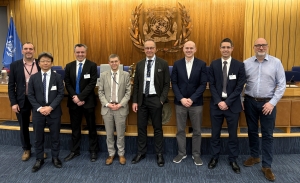


(Posted on 03/04/25)
The International Maritime Organization (IMO) has confirmed the expansion of the data reference model within the IMO Compendium on Facilitation and Electronic Business (IMO Compendium) following the conclusion of the 49th meeting of its Facilitation Committee (FAL 49), adding a range of standardised emissions reporting data fields for the first time.
The new ‘Fuel oil consumption and CII reporting dataset’ within the IMO Compendium includes more than 140 data fields for environmental reporting requirements, the majority of which have been newly added by IMO’s Expert Group on Data Harmonisation (EGDH) as part of the FAL 49 update. These new data fields aim to streamline emissions reporting and assist vessel operators in managing alignment with regulatory frameworks.
The move is the result of a twelve-month collaborative project involving the classification society members of the Smart Maritime Council – namely ABS, Bureau Veritas, ClassNK, DNV and Lloyd’s Register – working with BIMCO, the International Association of Classification Societies (IACS) and Energy LEAP to introduce new standards for emissions data reporting.
“The introduction of these emissions data standards by IMO creates huge opportunity for the industry to streamline the collection and exchange of vessel operational data required for mandatory reporting, and to significantly improve the quality of the information collected,” said Rob O’Dwyer, Chairman of the Smart Maritime Council.
“It has been fantastic to see the world’s largest classification societies come together to work on a project like this for the benefit of the whole industry, with the common goal of removing the barriers that currently exist in maritime digitalisation and assisting vessel operators in accessing the tools that can help them to make more efficient, environmentally sustainable business decisions.”
With classification societies acting as Accredited Verifiers for emissions reporting purposes, the creation of a single comprehensive standardised list of data points that satisfies the data requirements of all of the class participants would allow for widespread application in almost any relevant maritime emissions reporting process.
As such, the partners worked together on the creation of an aggregated list of data fields that satisfies the mandatory reporting requirements of current and future emissions regulations, including:
BIMCO and IACS subsequently submitted the classification societies’ combined standardised dataset to IMO to be considered for inclusion within the IMO Compendium, a process that has now been completed following FAL 49.
“To enable the shipping industry to achieve net-zero GHG emissions by 2050, we must prioritise the standardisation and harmonisation of our data collection processes for fuel oil consumption and CII reporting, as these are important parts of the verification process,” said Jeppe Skovbakke Juhl, Chief Naval Architect at BIMCO.“This approach not only streamlines our workflows but also enhances the precision and efficiency of ships’ emissions reporting. By achieving this harmonisation, we will facilitate more effective information exchange and can utilise the IMO Compendium as a tool to promote cooperation and trust in the data reported.”
AtoB@C Shipping, a subsidiary of ESL Shipping, has announced the successful delivery of Fleximar, the... Read more
Western Bulk, together with reputable Norwegian partners A/S J. Ludwig Mowinckels Rederi, Premium Maritime... Read more
Pacific Basin Shipping Limited, one of the world’s leading dry bulk shipping companies, has announced... Read more
Columbia Group anticipates a period of strong expansion as an increasing number of international shipowners... Read more
Norse?Ship Management has expanded its use of Smart Ship Hub’s high frequency sensor data and... Read more
As the maritime industry gears up to welcome the IMO’s STCW bullying and harassment training amendments... Read more
NORDEN has acquired the cargo activities of Taylor Maritime in Southern Africa (previously operated... Read more
Philippos Ioulianou, Managing Director of EmissionLink, has warned the IMO’s decision to delay... Read more
VIKAND has highlighted the need for cultural change in the maritime sector as reports of bullying, harassment... Read more
The maritime industry is experiencing a period of significant transformation, driven by rapidly evolving... Read more